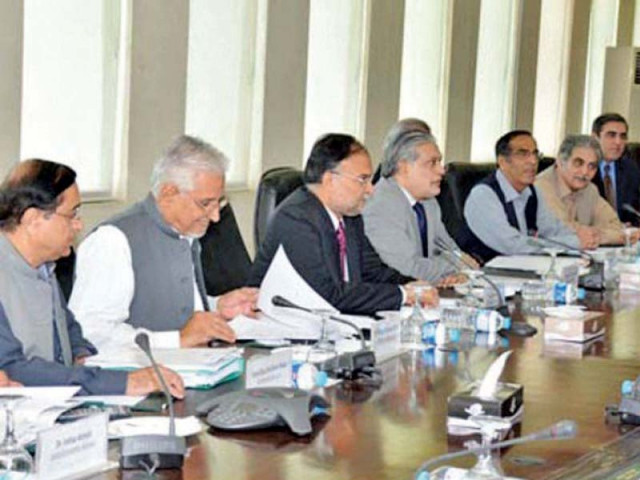Govt ‘concerned’ over falling exports, but not in the short-term
Finance ministry says there has been remarkable increase in foreign exchange reserves

Dar claimed that there was no load shedding for the industrial sector and electricity tariffs have been slashed. PHOTO: FILE
Members of the Monetary and Fiscal Policies Coordination Board - a statutory body tasked with setting the direction of economic policies - “showed concern on falling exports,” according to a Finance Ministry hand-out.
Some members cautioned that if the trend of decline in exports and increase in imports continued the country’s balance of payments position might come under pressure in the medium-term, said sources in the Finance Ministry.
Swat's variety of peaches exported, appreciated across the world
Finance Minister Ishaq Dar chaired the meeting of the Board, while Minister for Planning, Development & Reform, Secretary Finance, Secretary Commerce, Governor State Bank of Pakistan (SBP), former Governor SBP Dr Ishrat Husain and Vice Chancellor Pakistan Institute of Development Economics, Dr Asad Zaman, were also present at the meeting.
Commerce Minister Khurram Dastgir did not attend the meeting.
Pakistan posted a trade deficit of $4.8 billion in first two months of the fiscal year - higher by $1.1 billion or over 27% over the same period of the last fiscal year, after a steep decline in exports and double-digit growth in imports. Pakistan’s exports have been constantly falling for the last three years, creating concerns that any further decline may create problems in managing the books due to slowdown in growth of remittances.
Worker remittances also contracted 3.1% in the July-August period to just $3.1 billion but figures for August remained higher year-on-year.
The meeting observed that competitiveness was also one of the reasons in the decline of exports, said the finance ministry.
The impediments to ease of doing business and increase in cost of doing business were among the reasons for continuous decline in exports, according to officials who attended the board meeting.
During its three-year tenure, the PML-N led federal government has imposed over Rs1.1 trillion in taxes with most of them being direct in nature, which has significantly increased the cost of doing business. The government also increased the scope of dutiable imports to meet its revenue targets, which adversely affected the exports of the sectors depending on imported raw materials.
In today’s global production chain, custom duties are considered as barrier to exports, said a member of the Board.
The government has also blocked over Rs340 billion tax refunds of the people, which has further increased the cost of doing business by at least 3%.
Fruit, vegetable exports: PFVA for forging banking channels
Exporters also remain unable to bring modern technologies and thrived only on official bailouts and concession in duties and taxes.
The officials who attended the board meeting said, on condition of anonymity, that pressure on balance of payments might start building up by 2018 if the trend of decline in exports was not reversed. They said that due to tampered expectations and better positions of foreign currency reserves there was no threat to balance of payments in the short-term.
However, the Ministry of Finance contended in the meeting that there were no signs of deterioration and some segments were unnecessarily trying to portray a negative picture on the external accounts front.
The finance ministry claimed “remarkable increase in foreign exchange reserves”. It went on to say that during July 2016, current account deficit widened by $591 million due to fall in exports and remittances and non-payment of Coalition Support Fund.
The official hand-out quoted the finance minister as saying that the government has already initiated a number of measures for exports enhancement. Dar claimed that there was no load shedding for the industrial sector and electricity tariffs have been slashed. He stressed to look into the competitiveness aspect and suggested that meetings of Cabinet sub-committee on Production and Exports be held regularly and a multi-pronged approach at federal, provincial and local level be followed.
It is not the first time that Dar has given such directions.
During the May 2015 meeting of the Monetary and Fiscal Policies Coordination Board, Dar had asked the Ministry of Commerce to prepare time-bound action plans to enhance exports.
The implementation of tight fiscal and monetary policies during the three-year IMF programme also affected the country’s economic growth prospects. Furthermore, the Federal Board of Revenue has been assigned the task to collect Rs3.621 trillion in taxes in the new fiscal year, which will increase the burden on the industry.
Published in The Express Tribune, September 11th, 2016.
Like Business on Facebook, follow @TribuneBiz on Twitter to stay informed and join in the conversation.


















COMMENTS
Comments are moderated and generally will be posted if they are on-topic and not abusive.
For more information, please see our Comments FAQ